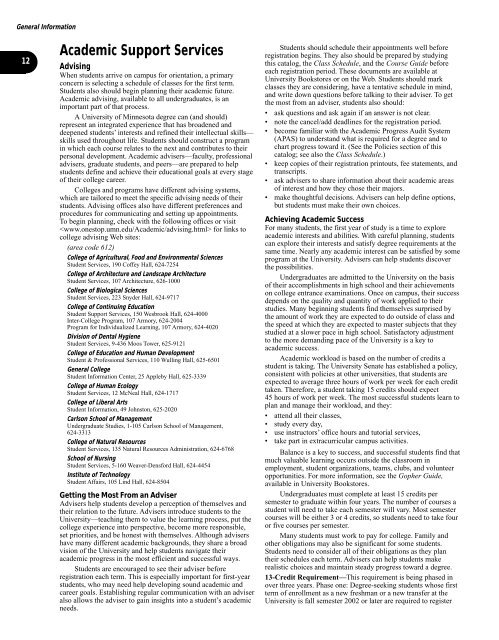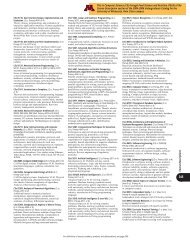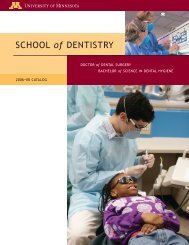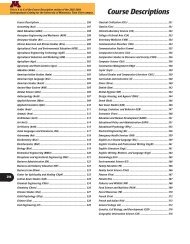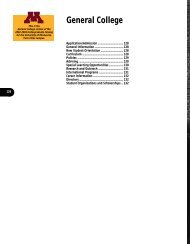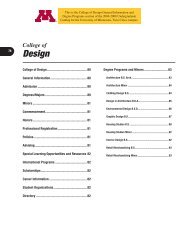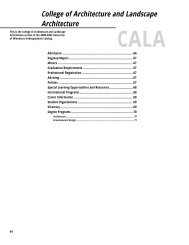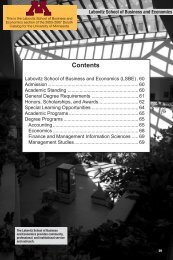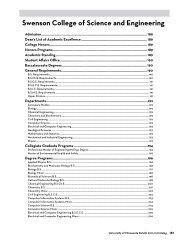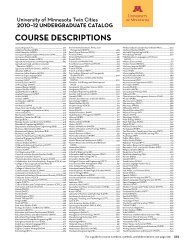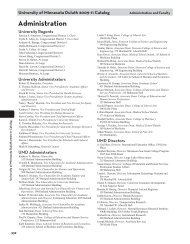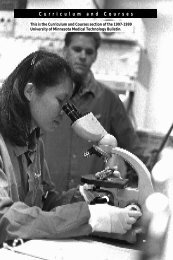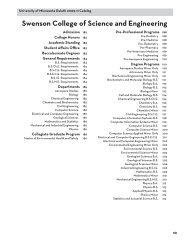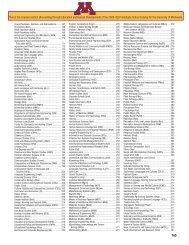Introduction, Degree Program/Majors Directory, General Information ...
Introduction, Degree Program/Majors Directory, General Information ...
Introduction, Degree Program/Majors Directory, General Information ...
You also want an ePaper? Increase the reach of your titles
YUMPU automatically turns print PDFs into web optimized ePapers that Google loves.
<strong>General</strong> <strong>Information</strong><br />
12<br />
Academic Support Services<br />
Advising<br />
When students arrive on campus for orientation, a primary<br />
concern is selecting a schedule of classes for the first term.<br />
Students also should begin planning their academic future.<br />
Academic advising, available to all undergraduates, is an<br />
important part of that process.<br />
A University of Minnesota degree can (and should)<br />
represent an integrated experience that has broadened and<br />
deepened students’ interests and refined their intellectual skills—<br />
skills used throughout life. Students should construct a program<br />
in which each course relates to the next and contributes to their<br />
personal development. Academic advisers—faculty, professional<br />
advisers, graduate students, and peers—are prepared to help<br />
students define and achieve their educational goals at every stage<br />
of their college career.<br />
Colleges and programs have different advising systems,<br />
which are tailored to meet the specific advising needs of their<br />
students. Advising offices also have different preferences and<br />
procedures for communicating and setting up appointments.<br />
To begin planning, check with the following offices or visit<br />
for links to<br />
college advising Web sites:<br />
(area code 612)<br />
College of Agricultural, Food and Environmental Sciences<br />
Student Services, 190 Coffey Hall, 624-7254<br />
College of Architecture and Landscape Architecture<br />
Student Services, 107 Architecture, 626-1000<br />
College of Biological Sciences<br />
Student Services, 223 Snyder Hall, 624-9717<br />
College of Continuing Education<br />
Student Support Services, 150 Wesbrook Hall, 624-4000<br />
Inter-College <strong>Program</strong>, 107 Armory, 624-2004<br />
<strong>Program</strong> for Individualized Learning, 107 Armory, 624-4020<br />
Division of Dental Hygiene<br />
Student Services, 9-436 Moos Tower, 625-9121<br />
College of Education and Human Development<br />
Student & Professional Services, 110 Wulling Hall, 625-6501<br />
<strong>General</strong> College<br />
Student <strong>Information</strong> Center, 25 Appleby Hall, 625-3339<br />
College of Human Ecology<br />
Student Services, 12 McNeal Hall, 624-1717<br />
College of Liberal Arts<br />
Student <strong>Information</strong>, 49 Johnston, 625-2020<br />
Carlson School of Management<br />
Undergraduate Studies, 1-105 Carlson School of Management,<br />
624-3313<br />
College of Natural Resources<br />
Student Services, 135 Natural Resources Administration, 624-6768<br />
School of Nursing<br />
Student Services, 5-160 Weaver-Densford Hall, 624-4454<br />
Institute of Technology<br />
Student Affairs, 105 Lind Hall, 624-8504<br />
Getting the Most From an Adviser<br />
Advisers help students develop a perception of themselves and<br />
their relation to the future. Advisers introduce students to the<br />
University—teaching them to value the learning process, put the<br />
college experience into perspective, become more responsible,<br />
set priorities, and be honest with themselves. Although advisers<br />
have many different academic backgrounds, they share a broad<br />
vision of the University and help students navigate their<br />
academic progress in the most efficient and successful ways.<br />
Students are encouraged to see their adviser before<br />
registration each term. This is especially important for first-year<br />
students, who may need help developing sound academic and<br />
career goals. Establishing regular communication with an adviser<br />
also allows the adviser to gain insights into a student’s academic<br />
needs.<br />
Students should schedule their appointments well before<br />
registration begins. They also should be prepared by studying<br />
this catalog, the Class Schedule, and the Course Guide before<br />
each registration period. These documents are available at<br />
University Bookstores or on the Web. Students should mark<br />
classes they are considering, have a tentative schedule in mind,<br />
and write down questions before talking to their adviser. To get<br />
the most from an adviser, students also should:<br />
• ask questions and ask again if an answer is not clear.<br />
• note the cancel/add deadlines for the registration period.<br />
• become familiar with the Academic Progress Audit System<br />
(APAS) to understand what is required for a degree and to<br />
chart progress toward it. (See the Policies section of this<br />
catalog; see also the Class Schedule.)<br />
• keep copies of their registration printouts, fee statements, and<br />
transcripts.<br />
• ask advisers to share information about their academic areas<br />
of interest and how they chose their majors.<br />
• make thoughtful decisions. Advisers can help define options,<br />
but students must make their own choices.<br />
Achieving Academic Success<br />
For many students, the first year of study is a time to explore<br />
academic interests and abilities. With careful planning, students<br />
can explore their interests and satisfy degree requirements at the<br />
same time. Nearly any academic interest can be satisfied by some<br />
program at the University. Advisers can help students discover<br />
the possibilities.<br />
Undergraduates are admitted to the University on the basis<br />
of their accomplishments in high school and their achievements<br />
on college entrance examinations. Once on campus, their success<br />
depends on the quality and quantity of work applied to their<br />
studies. Many beginning students find themselves surprised by<br />
the amount of work they are expected to do outside of class and<br />
the speed at which they are expected to master subjects that they<br />
studied at a slower pace in high school. Satisfactory adjustment<br />
to the more demanding pace of the University is a key to<br />
academic success.<br />
Academic workload is based on the number of credits a<br />
student is taking. The University Senate has established a policy,<br />
consistent with policies at other universities, that students are<br />
expected to average three hours of work per week for each credit<br />
taken. Therefore, a student taking 15 credits should expect<br />
45 hours of work per week. The most successful students learn to<br />
plan and manage their workload, and they:<br />
• attend all their classes,<br />
• study every day,<br />
• use instructors’ office hours and tutorial services,<br />
• take part in extracurricular campus activities.<br />
Balance is a key to success, and successful students find that<br />
much valuable learning occurs outside the classroom in<br />
employment, student organizations, teams, clubs, and volunteer<br />
opportunities. For more information, see the Gopher Guide,<br />
available in University Bookstores.<br />
Undergraduates must complete at least 15 credits per<br />
semester to graduate within four years. The number of courses a<br />
student will need to take each semester will vary. Most semester<br />
courses will be either 3 or 4 credits, so students need to take four<br />
or five courses per semester.<br />
Many students must work to pay for college. Family and<br />
other obligations may also be significant for some students.<br />
Students need to consider all of their obligations as they plan<br />
their schedules each term. Advisers can help students make<br />
realistic choices and maintain steady progress toward a degree.<br />
13-Credit Requirement—This requirement is being phased in<br />
over three years. Phase one: <strong>Degree</strong>-seeking students whose first<br />
term of enrollment as a new freshman or a new transfer at the<br />
University is fall semester 2002 or later are required to register


